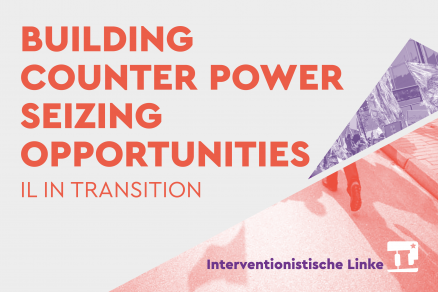
Getting out of the bubble and into the scuffle of social conflicts. The Interventionist Left started their work with this ambition almost 20 years ago. We wanted to become a radical left embedded in society, to be visible and approachable, fight for political hegemony and organize counter power.
A lot has happened since then. Today, the Interventionist Left is one of the largest radical left structures in the German-speaking world. We are represented by local groups in over twenty cities. We have succeeded in developing from a loose association of local groups into an interregional organization based on principles of direct democracy. Block G8, Ende Gelände, Blockupy, Feminist Strike, Summer of Migration, NoG20, Rheinmetall Entwaffnen, Deutsche Wohnen and Co Enteignen1 are examples of the many struggles we are and have been involved in. With blockades, occupations and direct interventions, we have contributed to establishing mass disobedience as a legitimate form of action.
At the same time, the current outlook for the future of the world is grim. The left is on the defensive in all parts of the world. The right-wing project of closed borders, division and denial of the climate crisis is booming. States are becoming more authoritarian internally and more belligerent externally, whether they are led by supposedly progressive parties or right-wing anti-democrats. Neither have viable answers to the multitude of crises the world is facing.
What we need right now is a left-wing alternative that provides hope and orientation. But we have not succeeded in channeling the successes of the movements of the last decade into one common pole of resistance, to fight for fundamental change. Capitalism remains securely in the driver's seat.
Therefore it is high time to reevaluate our strategies and practices. What do the political developments of recent years mean to us? What opportunities and objectives do we have for changing the world? What are the strategies of interventionist policy in the current situation? We have racked our brains over these and other questions and have argued about them on many occasions. Nonetheless, many of our debates are still in their early stages. This paper represents the results of our discussions. It is an update to and an expansion of our “Zwischenstandspapier” interim paper “Die IL im Aufbruch” from 2014.
One of the next steps is organizing a process of orientation in the radical left. Our reflections are therefore first and foremost a starting point, an invitation to join the debate to anyone who, like us, is driven by the longing for a different, a liberated world. This is why such a big part of this text is devoted to our analysis of the current political situation. We are documenting the current state of our discussions, that hopefully provide orientation for the coming debates. The following chapters are an update to our strategy and practice. We learn from our mistakes, hold on to what has worked and discard what has not. For us, this is an essential feature of undogmatic politics.
Anyone looking for simple answers in this paper will be disappointed. A new reformism that, in the face of the shift to the right and the climate crisis, only dares to address what is within the immediate reach of current institutions is too simple. Superficially turning to the working class once again, a move that all too often leads to dogmatism and authoritarianism, is too simple. The type of identity politics that clings to identities instead of questioning them and of which little encouragement for the common struggle for a better world can be expected, is too simple. In contrast, we want to be a radical left that continues upholding the possibility to change everything, even in times of darkness. A radical left that is organized and present in everyday life, that recognizes opportunities and seizes them decisively. That expands small ruptures into large ones and takes the bet on revolution. We continue holding onto this aspiration and promise.
